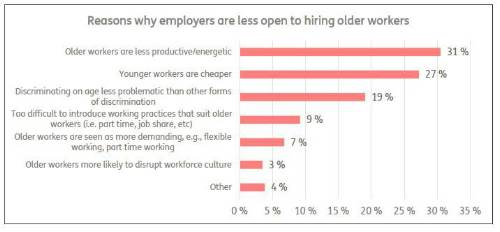Research carried out by retirement specialist Just Group uncovers that the majority of retirees – especially those who would still like to be working – believe employers harbour an ageist approach to hiring older workers.
The survey of over 1,000 retired and semi-retired people aged over 551 found that more than half (55%) believe that employers are less open to hiring older workers, with only 17% disagreeing.
Among retirees aged 55+ who would still like to be working – and therefore more likely to be directly experiencing negative attitudes from employers – nearly three-quarters (72%) think that businesses have an ageist attitude to recruitment.
When asked why this might be case, nearly a third (31%) of 55+ retirees stated that they thought employers see older workers as less productive and energetic. Over a quarter (27%) stated that it was because younger workers were cheaper and a fifth (19%) said that discriminating on age was seen as less problematic for companies than other forms of workplace discrimination.
The research also uncovered that over 55s believe part of the problem is that employers think it is too difficult to introduce working practices that suit older workers (9%) or that older workers are more demanding (7%) and likely to disrupt workforce culture (3%).

Stephen Lowe, group communications director at retirement specialist Just Group, said: “The government is keen to encourage some of the 2.7 million economically inactive people aged 55-642 back into the workforce but our research suggests this could be tricky when many retirees believe they aren’t getting a fair crack of the whip with employment opportunities.
“Those who are still interested in, or would like to be, working felt particularly aggrieved and perceive hiring practises of many employers as fundamentally ageist and tilted towards younger workers.
“Fair access to the labour market in later life is important because it allows over 55s the opportunity to get back on track should they face an unexpected life event that forces them out of the labour market. Without this equal opportunity they face the triple whammy of loss of income, loss of opportunity to save more into their pension and possibly being forced to raid their pension earlier than expected to make ends meet.”
The survey from Just Group also found that nearly half (45%) of retired and semi-retired over-55s retired earlier than they had expected. Of those people, the majority (58%) said they were driven out of the workforce due to factors beyond their control rather than choosing to retire for more positive reasons.
A third (33%) of those forced out of work early, said that they retired earlier than expected because of ill-health or physical impairment. A further 15% were either made redundant or could not find a job while one in 10 (10%) said they retired earlier than expected to provide care for a family member. It means one in four (26%) of all retirees over the age of 55 had been forced out of the workforce.
“The assumption that people can work for as long as they choose is a dangerous one. Our research found that a significant proportion of people are forced to leave the labour market earlier than expected, many due to circumstances beyond their control.
“If they feel like they are unlikely to be employed again then it means they must bridge the financial gap between leaving work and receiving the State Pension. Many will be forced to do this by stretching their private pension and other savings over a much longer period than expected.”
|

